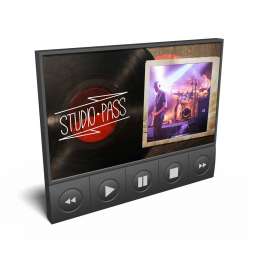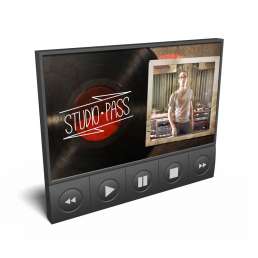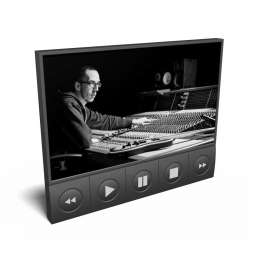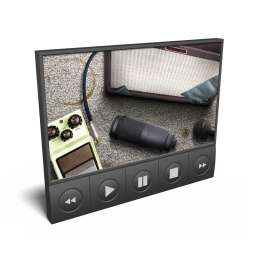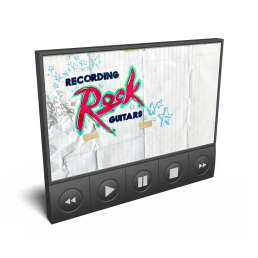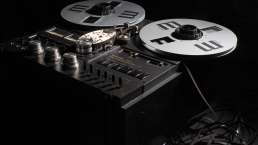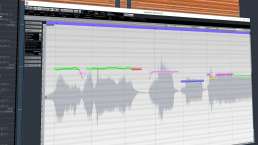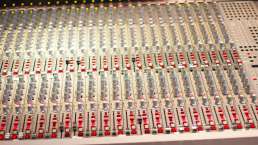For people who are getting started with music, production terms like mixing, mastering, recording, editing or pre-production can quickly lead to confusion. Therefore, I’m going to explain the basic meaning of the four music production disciplines and elaborate on when in the production process they usually happen and what is getting done in each step.
Before I go into further detail, let’s talk about the most essential thing that all outstanding productions have in common: GOOD SONGS! It sounds obvious, but in times when more and more generic, profit-oriented music is being released, it can not be stressed enough that honing your skills on the instrument and investing in your creativity is more rewarding than having the fanciest sounding production on songs that all sound the same.
In other words, a solid craftmanship is always the groundwork for a long lasting career in music. Since you presumably don’t want to drive your producers crazy, your own songs should have a certain quality. Otherwise the best recording, mixing or mastering engineer can’t make hits out of them and even the best marketing strategy will fail.
That said, I recommend to always improve your songwriting and instrumental skills (write and play as many songs as possible), get feedback from friends and people who don’t know your music yet, be critical to yourself and as a result you will save a lot of time, money and energy.
1. Pre-Production
After writing a marvelous song in your rehearsing room you want to present it to a broader audience. Therefore you book a studio to get a sound that can compete with “the big ones”. At this point the first of the four music production disciplines comes into play: pre-production. Most of todays producers want to have a basic idea on how a song is structured, what the main instruments are, how many vocal tracks there are and, of course, if it’s a metal-, pop- or an EDM track. It will also save time and money when you don’t have to discuss these things when the studio clock is already ticking.
But what is a pre-production? It’s a simple and quick recording of your song that you can do by yourself or with the help of a producer at your rehearsing space or your homestudio. It should carry the basic message of the song and serve as a blueprint for the actual recording process later in the studio. Nowadays, it’s possible to do a pre-production with just a laptop, an audio interface, a reasonable priced microphone and maybe a few VST instruments.
It also shows the producer that you are dedicated towards your music and that you have thought about things like instrumentation and how you want the finished song to sound in the end.
2. Recording
After you’ve pre-produced your songs it’s time for the second of the four music production disciplines: Recording. The recording process is usually the first step in getting your music to CD/Spotify/iTunes. It’s the primary step that defines the basic sound of your record and above all, it’s the moment when you try capture all the underlying emotions of your music to the best of your abilities.
Therefor, it’s crucial for every instrumentalist and vocalist to be well prepared for the session. Bring new guitar- or bass strings, pack your favorite stomp-boxes, drum sticks, kick pedals, drum-thrones, microphones, headphones, synthesizers and all the other stuff that makes you feel comfortable on your instrument. Make sure that you have practiced all your parts well enough to prevent the whole experience from going south! It can be really frustrating when you can’t deliver a satisfying performance and, as a result, get behind schedule.
In each studio there should also be at least one experienced engineer who takes care of all the recording stuff while you can fully focus on playing. If not, the studio was probably the wrong choice and, for the sake of the outcome, it’s better to book another one.
3. Editing & mixing
The third of the four music production disciplines is not just one but actually two: Editing & mixing. Most of todays engineers don’t have an editing assistant and, therefore, are responsible for both tasks in their productions.
During editing your recorded session gets prepared for mixing. This, for example, includes cutting unneeded stuff like scratching-noises in the audio tracks, aligning drums to the the “grid”, doing cross-fades between tracks, tuning vocals, making sure all the tracks are in phase and much more. Editing can be a monotonous and repetitive work but it makes the following ”creative-mixing” a lot easier. But be aware of the pitfalls: Always use caution when editing because it happens way to easy to cut all the life out of your recordings.
Mixing, on the other hand, is the process where all the recorded tracks are fit into a stereo or 5.1 canvas. Therefor, techniques like panning, leveling, equalization, compression and reverberation are used to fully utilize this limited space and to shape the record to your liking. With proper mixing skills a good record can be transformed into an outstanding one or the overall vibe can be changed from, for example, ultra-dry 70’s funk to a “swimming in reverb” sound of the 80’s. It’s alos a highly creative process where your imagination is the only limitation.
4. Mastering
Mastering is the fourth of the four music production disciplines that actually consists of two stages. Firstly, the finalization of the audio material and secondly, the deployment of the files to the distributor in the requested audio format (wav, mp3, …). The main focus lies on correcting minor mixing errors in all the recorded songs and then finding a song order that feels “right” for the particular album. Therefor, a little corrective equalization, a bit of compression and limiting and maybe some reverb is applied to match the overal sound of the individual songs. In other words, mastering is like proofreading a book: you don’t change the content, but only correct the mistakes that the mixing engineer failed to hear after hours and hours of mixing.
A mastering engineer also makes sure that all songs sound good on a wide variety of playback devices like car-speakers, kitchen radios or headphones. Although it is possible to do it by yourself, it’s usually a good idea let someone who has experience and proper equipment (speakers, room and gear) do the mastering.
If you have other questions about homerecording feel free to browse through all my homerecording posts.
Header-image: Google image search
Relevant products
Similar posts
Music production history – The 5 most important eras
Music production history and the path to our modern way of recording is characterized by many…
What is a pre-production and do I need it for my record?
The pre-production is the one part in music production that many musicians do not know much about.…
Things you should know before recording in a studio
Even nowadays, one of the main goals of many bands is to record their music in a professional…
What is audio editing and is it really necessary?
You've carefully recorded all your instruments with the best possible audio quality and you've put…
Mixing audio – What is mixing and can I do it myself?
Thanks to modern technology, almost anyone can produce their music at home - even with a low-budget…
What is mastering and do I really need to master my tracks?
Nowadays songs get mixed on headphones, music is consumed via cellphone speakers but also played on…


